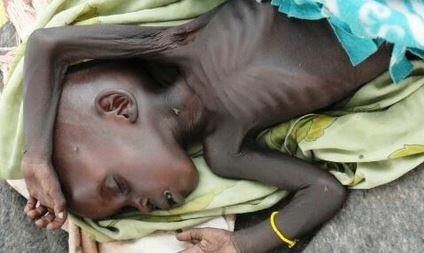The people in parts of Sudan’s Nuba Mountains Region have resorted to eating the leaves of some trees and locusts among other unusual diets due to lack of food, officials said.
The representative of the Sudan Relief and Rehabilitation Agency (SRRA) in the Nuba Mountains Region, Kafirad Kuku Kajam Tia, told Radio Tamazuj that the most affected areas are Lagawa and Alsunut counties where locusts destroyed crops last year.
“The situation in those counties is worsening every day as the war and famine in Sudan have affected them. In 2023, locusts destroyed many farms in the two counties and people did not harvest enough crops that is why there is a lack of food,” he explained. “The little food people collected for their families was shared with the people displaced from Khartoum, neighboring states and counties and it is now finished. The humanitarian situation is worsening as people are now eating the leaves of the trees and locusts to survive because there is no food.”
Kuku appealed to humanitarian agencies and well-wishers to rescue the vulnerable population of Lagawa County.
“If there is no help from humanitarian organizations, we do not know what will happen to the big number of 9,000 displaced people which is increasing daily,” he added. “The high prices of consumer goods have also affected the citizens and or IDPs in the payams of Kasha, Siber, and Abujirad.”
Meanwhile, a local government official in Al-Sunut County, Garif Adam Garif, told this publication on Tuesday that commodity prices have soared in the local markets with 3.7 kg of sorghum shooting up to SDD 5,000.
“The rains were bad last year and crops did not yield well, thus leading to a lack of food. Locusts also affected food production in the farms in Al-Sunut County in 2023,” he said. “The coming of IDPs from El-Obeid, Khartoum, Dilling, and Habila increased the population of Al-Sunut County resulting in a lack of food for many households.”
He added the people of Alsunut County have not received any food aid since the war broke out in Sudan on 15 April 2023.




